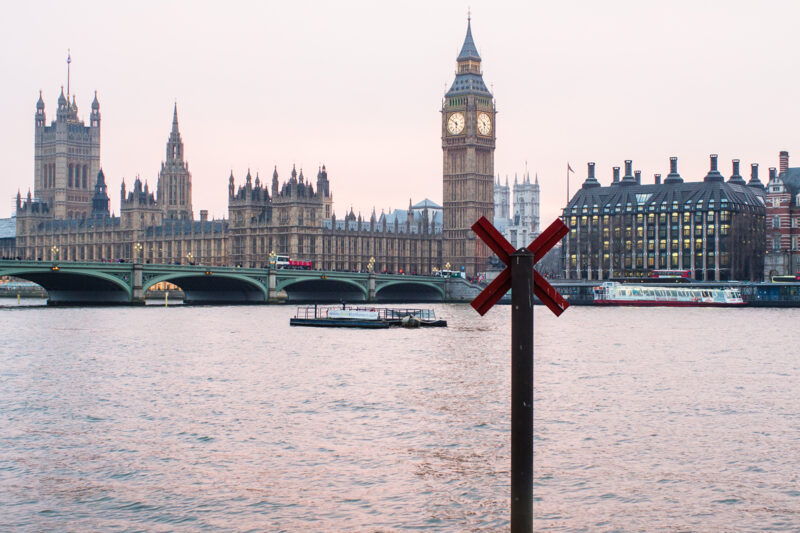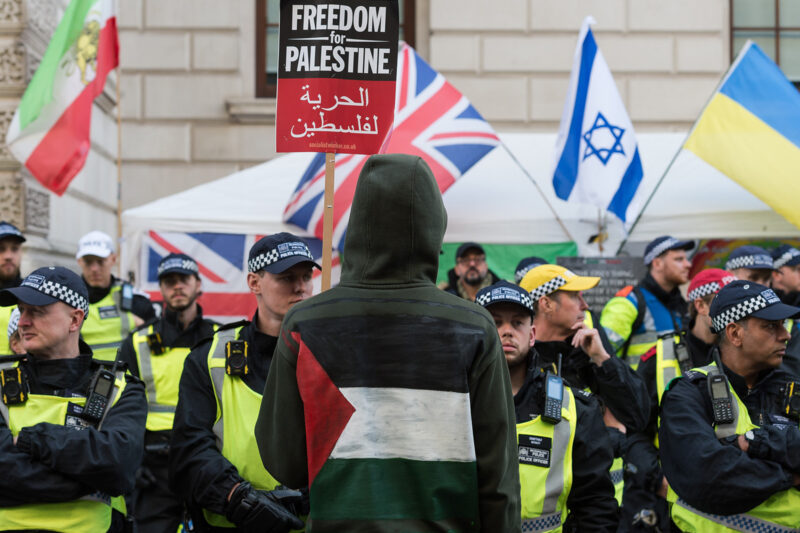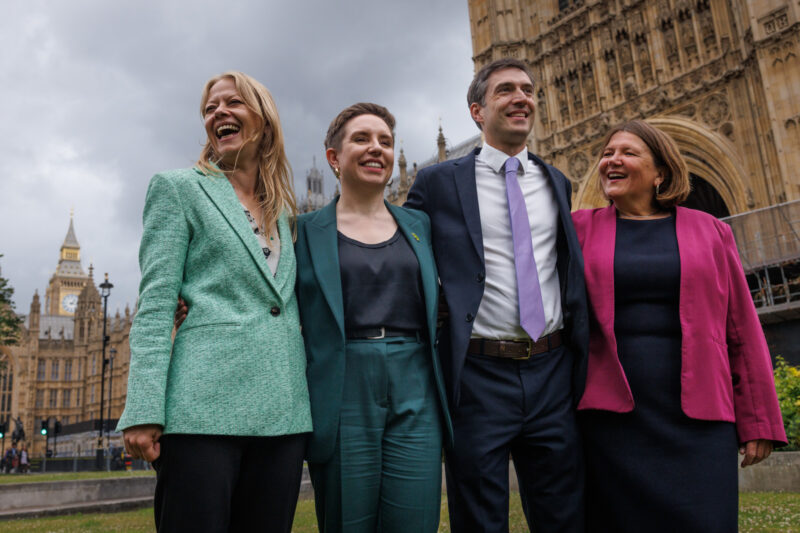Muslim support for Labour is plummeting — can independent challengers fill the void?
Sir Keir Starmer’s party is poised for electoral victory, but its position on Gaza has alienated many voters

“No ceasefire, no vote!” On Saturday, 3 February, those words rang out across Whitehall as hundreds of thousands of protesters filled central London with Palestinian flags and calls for an immediate cessation of hostilities in Gaza. It was the eighth such march since October, when Israel began its bombardment of the territory. Since then, more than 27,000 Palestinians have been killed, including at least 11,500 children.
The crowd was angry, loudly criticising not just the actions of the UK government but what it viewed as a grossly inadequate response from the opposition. Over the past four months the Labour party has not only refused to demand an immediate ceasefire. Its leader, Sir Keir Starmer, has also faced heavy criticism for publicly stating that Israel was justified in cutting water and electricity supplies to Palestinian civilians.
So far, Labour’s position on Gaza has contributed to the party’s loss of control of Oxford, Burnley, Norwich and Hastings councils, following the resignations of more than 70 sitting councillors. Now, it is jeopardising Labour support in the forthcoming general election. In 2019, 86% of British Muslim voters backed Labour, according to data cited by the polling organisation Survation. A new Survation poll, released on 5 February, shows a drastic fall in those numbers. When asked how they would vote today, only 43% of the 682 British Muslims canvassed said they would definitely vote Labour, with 23% undecided.
A growing number of independent candidates are seeking to stand against Labour in the general election. One of the most prominent is 23-year-old British-Palestinian Leanne Mohamad. “We will remember the name of every single politician who did not vote for a ceasefire,” she said to widespread applause at the London protest. “We’ll remember those who aided and abetted and applauded these war crimes and we will hold them accountable at the ballot box.”
Mohamad is standing in Ilford North against Shadow Health Secretary Wes Streeting, a man frequently touted as a future Labour leader. She was selected after a hustings of potential candidates organised by the Redbridge Community Action Group. While Mohamad may not succeed in toppling Streeting, with his majority standing at 5,000 and with Muslims making up 30% of the constituency, her candidacy could cause him serious headaches.
Mohamad is not alone. On January 17, Kirklees councillor Ammar Anwar resigned from Labour over its position on Gaza. In a tearful resignation speech at a council meeting, he recounted to his colleagues that his five-year-old daughter had seen images of Gaza and said to him, “Dad, what have you done about the videos you were watching?”
Anwar intends to stand in the West Yorkshire constituency of Dewsbury and Batley, a new seat created after boundary reviews, which is home to a significant British-Pakistani population. Like many British Pakistanis, Anwar was a lifelong Labour supporter and the kind of community leader the party has typically relied on to get the vote out on polling day.
Meanwhile, in Bethnal Green and Bow, incumbent MP Rushanara Ali will be challenged by lawyer Tasnime Akunjee. Ali, who did not vote for a ceasefire in parliament, has seen numerous protests outside her constituency office over recent months.
In fact, the wider east London area poses challenges for Labour. In 2022, the party lost control of Tower Hamlets Council to Aspire, the successor to Bangladesh-born solicitor Lutfur Rahman’s Tower Hamlets First party — a significant loss for Labour, given that it held 42 out of 45 seats in 2018.
Setting a relevant historical precedent, in 2005 Labour lost the Bethnal Green and Bow parliamentary seat to George Galloway, who capitalised on anger over the Iraq war while standing for the now-defunct Respect party. In the 2012 Bradford West by-election Galloway caused one of the biggest upsets in British parliamentary history, taking the seat from Labour and increasing Respect’s share of the vote by 52.8%. Now, he hopes to replicate those successes for the Workers Party of Britain in the February 29 Rochdale by-election.
While it is tempting to consider that we have been here before, with widely criticised foreign policy positions eroding Labour support among Muslim voters and opening up the field for insurgent figures such as Galloway, it is worth remembering that his biggest triumphs were achieved under the banner of a national political party that grew out of the wider Stop the War Coalition. The current independent challengers appear not to have the same levels of coordination.
That could change as the general election draws nearer and the Israeli assault on Gaza continues. But, with the Conservatives in disarray and Labour maintaining a consistent and clear lead in national polls, can they make any real difference to what appears to be an inevitable election result?
Given Labour’s comfortable lead, the party is on track to win even if there is a complete collapse in Muslim support. But those votes could be decisive in a dozen individual constituencies across the country. From Bethnal Green and Bow to Birmingham Ladywood, Muslim voters number tens of thousands. Factor in, too, that many non-Muslims are equally concerned about Labour’s stance on Gaza and it is possible to see organised independent challengers posing a significant threat. In marginal constituencies such as Streeting’s, such a campaign could even split the opposition vote and allow a Tory MP in.
Independent campaigns also have the potential to place pressure on Labour to reexamine its stance on Gaza. A general election forces parliamentary candidates to engage with their constituencies, meet members of the community and perhaps be grilled on key issues at hustings. While there is a good chance that such scrutiny will not be the catalyst for radical change, it could move the needle on some issues.
After all, the rebellion by a fifth of the parliamentary Labour party over a November Scottish National Party motion calling for a ceasefire in Gaza was brought about by significant lobbying. Labour also appears to have shifted from its earlier position of calling for a humanitarian pause in Gaza but stopping short of advocating for a full ceasefire. Shadow cabinet ministers are now stepping up their criticisms of Israel and the party is calling for a “sustainable ceasefire”, no doubt in response to the backlash it has faced. A “sustainable” ceasefire, as articulated by Foreign Secretary David Cameron and others, is, however, not the same as an “immediate” one and is predicated upon the fantasy of the total elimination of Hamas.
As the death toll in Gaza continues to escalate, voters are demanding more from their elected representatives. In recent months, Labour politicians have faced demonstrations in council chambers and outside constituency offices. On February 5, the party cancelled its race equality policy launch for fear of further protests. The hundreds of thousands of people outraged by the plight of the Palestinian people are not going away and, be it through pressure from voters or independent challengers, Starmer could yet be forced to really listen.
 Newsletter
Newsletter













